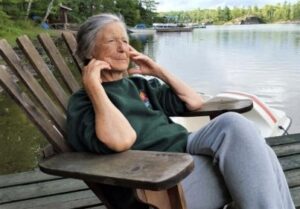Joscelyn Hurst, who perhaps was better known as Joy, wasn’t always an outdoorsy type. As a child, she grew up playing the piano, her love for the natural world rooted in the romanticism of poets, flowers and an observance of seasons turning with the ever-changing flora.
Love was also what led Joy into a crash course in outdoor survival. Married to a geologist, she accompanied Donald in the 1950s to a work camp in Labrador were they lived in canvas tents and cooked on gas stoves. “My dad was the outdoorsy type, my mom became one,” says EJ Hurst, one of Joy and Don’s three daughters. EJ, who lives on Gabriola Island, recalls one of the many visits that her parents made to the island. “They loved the whole experience of being with us, on the ocean. We have a photo of them arriving on the bow of a tugboat when the ferry wasn’t running. They’re looking so proud of themselves, with their backpacks and skis.”
EJ describes her mom as a very beautiful, strong community leader, who loved to sing and direct community productions, noting she had a knack for supporting people, especially youngsters, to discover their creativity. “She was super creative. She sewed my wedding dress using a magazine clipping I had sent her of a woman running through a grass field in a light and flowy dress.”

Joscelyn Hurst
Joy found peace and beauty in the natural world, in particular from the ocean. “She’d walk for hours along the beach after my dad died. I think it restored her,” EJ says. Joy’s adventurous side was also connected, at times, to the ocean. One of her last trip, something she planned from her hospital bed while recovering from hip surgery, was a tour in the Galapagos Islands to engage with guest naturalist, Canadian artist Robert Bateman, who had a big influence on Joy’s life.
‘Nature is priceless’ are the words that EJ found underlined in her mom’s copy of JB MacKinnon’s The Once and Future World after Joy died. “That really sums up her view of the world,” EJ says.
